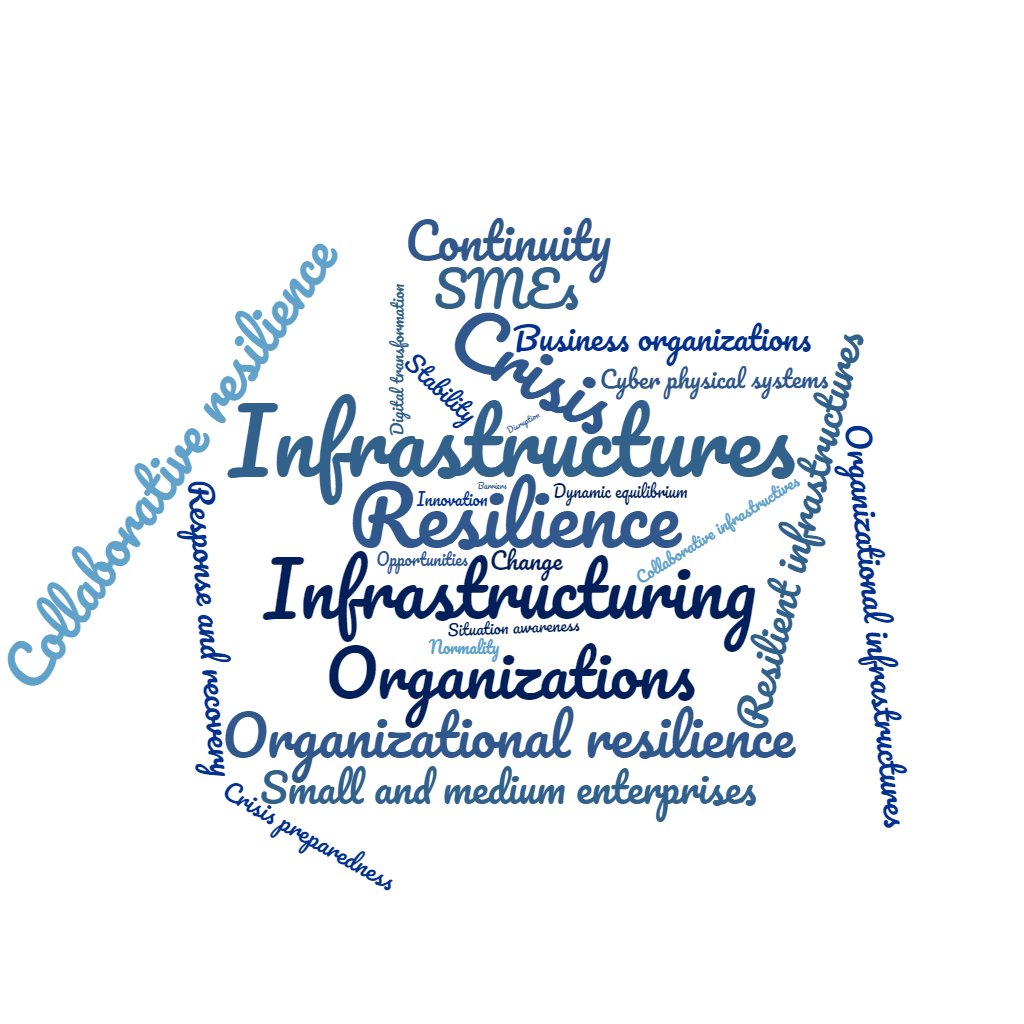
TOPIC
This workshop discusses organizational resilience and resilient infrastructures by uniting researchers, professionals, and experts from various disciplines. Workplace studies and organizational settings have always been an integral theme in computer-supported cooperative work (CSCW) research. This workshop hopes to broaden this research horizon by overlapping the multidisciplinary perspectives of resilience and crisis research with human-computer interaction (HCI), CSCW, organizational, and business studies. The COVID-19 pandemic and the subsequent physical and social constraints have been detrimental to the activities of different organizations, especially to small and medium enterprises (SMEs). SMEs must recognize and search for opportunities to adapt to this crisis by developing resilient organizational infrastructures. These adaptations can be crucial to overcoming the current disruptions challenging the continued existence keeping in view the intrinsic diversification of various business and industrial sectors. How organizational infrastructures can be designed to instill resilient properties like adaptive capacity, self-adjustment, and continuity? We intend to focus on bringing this discussion under the umbrella of CSCW to explore the potentials of collaboration and cooperative work in organizational infrastructure. Through this workshop, we offer research prospects by applying organizational resilience theories to study organizational infrastructure and infrastructuring activities, which can be used for their prospective transformations into resilient infrastructures.
ORGANIZERS
Hussain Abid Syed is a Ph.D. researcher in the BMBF junior research group KONTIKAT at the University of Siegen, Germany. He is a computer scientist with a specialization in software technology and data science. His interests include human-machine interaction (HCI), computer-supported-cooperative work (CSCW), model-driven software development (MDSD), and machine learning (ML). He is keen on the application of computing techniques and software technologies for the enhancement of organizational resilience. His current research focus is to tailor resilience practices to the context of small and medium enterprises. He collaborates with the enterprises employing qualitative and quantitative research methods to generate steady requirements for resilient infrastructures.
Marén Schorch is a Postdoctoral Researcher and leader of the BMBF junior research group KONTIKAT at the University of Siegen, Germany. She is a sociologist specializing in qualitative research methods and disaster research. Her current research deals with continuity and (digital, social, economic) change, and emergency preparedness. She has published a wide range of articles on her varied research, co-edited the book “Learning and Calamities. Practices, Interpretations, Patterns.” (Routledge 2015), co-organized several workshops such as on ECSCW 2020 and 2011, CSCW 2014 and CSCW 2017, COOP 2016 and GROUP 2016, held two masterclasses at ECSCW 2019 and also acts as AC and reviewer for those conferences (ECSCW, CSCW, CHI etc.).
Sam Addison Ankenbauer is a writer and qualitative researcher. His interests broadly investigate how technologies can mediate traditional spaces and how these physical spaces are currently adapting to newer technologies. His current research explores the tensions between technologies, physical spaces, and the people who utilize technologies and inhabit spaces. Sam is a doctoral student at the University of Michigan School of Information. He is also the author of The Wailing for Liverpool University Press.
Sohaib S. Hassan is a member of the BMBF junior research group KONTIKAT at the University of Siegen, Germany. He is a Postdoctoral Researcher at the School of Economic Disciplines, University of Siegen. He is also the Research Coordinator & Advisor at SME Graduate School, Faculty III, University of Siegen. His research interests include Strategic Management, SMEs, Innovation, Digital Transformation, Business Continuity Management
Martin Stein is a Post-Doc researcher at the Fraunhofer Institute for Applied Information Technology FIT, Germany and managing director of open.INC, a startup focussing on IIoT-solutions. He received his PhD from the School of Economic Disciplines at the University of Siegen in the department of Information Systems and New Media. His research is centred around the topics of mobility support, complex information processing and visualization and participatory design. In his most recent work, he focuses on the impact of industrial internet of things (IIoT) technologies on the organizational setting and qualifications needs of SMEs. He (co)-authored several conference and journal papers, including publications at ACM CHI Conference on Human Factors in Computing Systems, ACM Transactions on Computer-Human Interaction, International Journal of Human-Computer Studies, International Conference on Supporting Group Work, Conference on the Design of Cooperative Systems (COOP). Further, he served as associate chair for MobileHCI Late Breaking Work 2017 and as reviewer for, e.g. JCSCW, ACM CHI, ACM CSCW, ECSCW, COOP and IS-EUD.
Konrad Meisner is a Ph.D. student at the university of Siegen at the Chair for Entrepreneurship and Family Business and a junior researcher at the KontiKat researcher group. He worked in strategic management in an SME, preparing innovation and business development on a long-term orientation. He further on studied SME Management with a focus on family businesses. His current field of research lies within the digitalization of SMEs and family business, innovation management and gender-studies.
Sascha Skudelny is a research fellow at the Institute for Media Research and the iSchool at the University of Siegen. He studied media sciences and human medicine and is doing his doctorate at the Institute for Microsystems Technology. His publications and research focus on security communication, collaborative technologies, process and communication modeling of complex systems, user experience/usability design and social media analysis/social network analysis as well as business resilience management and social (governance) resilience management.
Helena Karasti is Professor in the Department of Digital Design at IT University (ITU) of Copenhagen, Denmark. Her research interests include infrastructuring, information/knowledge/research infrastructures, critical data studies, and integrations of ethnography and design. She has widely published in the fields of Computer Supported Cooperative Work (CSCW), Participatory Design (PD) and Science and Technology Studies (STS). She leads the Responsible Infrastructuring research group at ITU.
Volkmar Pipek is a Professor of CSCW and HCI at the University of Siegen, Germany, and has widely published books and articles in CSCW, with a specific interest in infrastructuring. He is also the co-leader of the project “INF-Infrastructural Concepts for Research in Cooperative Media” at the Collaborative Research Centre 1187: Media of Cooperation and mentor of the BMBF junior research group KONTIKAT at the University of Siegen.